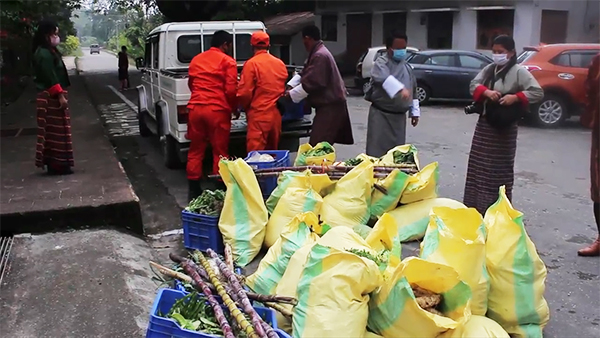 The lockdown has taught so many lessons. And one of them is bringing people together. People have been supporting frontline workers in many different ways. And farmers are among the heroes of the COVID-19 pandemic.
The lockdown has taught so many lessons. And one of them is bringing people together. People have been supporting frontline workers in many different ways. And farmers are among the heroes of the COVID-19 pandemic.
Vegetables are the new gold. A pickup truckload of vegetables arrives at the COVID-19 control room in Samdrup Jongkhar. DeSuups on duty then load onto another vehicle for distribution. And these vegetables will go to remote areas, where the frontline workers guard the border.
Some farmers from Dewathang and Orong gewogs in Samdrup Jongkhar contributed vegetables worth of Nu 80,000. And that is three bolero pickup truckloads of vegetables. The Samdrup Jongkhar Initiative, a Civil Society Organization collected the vegetables from the gewogs.
“This is for the selfless service and the sacrifices made by the frontline workers. We are very grateful to them for keeping us safe though it is a drop in the ocean,” Karma Tenzin.
“They are doing their best to fight the virus. And this is all that we can do. We are very thankful to our frontline workers,” Kinzang Wangdi.
And this simple act of solidarity sends an important message to the frontline workers that people are with them. The frontline workers said it empowers them and encourage them to do their job wholeheartedly.
“Samdrup Jongkhar Initiative has been contributing vegetables to us and this time also they contributed in huge quantity and we are very thankful, we have distributed it in all the outpost,” said Rinchen Dorji, a DeSuup.
Meantime, winter vegetable is not a problem in Samdrup Jongkhar. The agriculture sector has been supplying vegetables to the shopkeepers during the lockdown.
Chorten Gyeltshen, Dzongkhag Agriculture officer said that “we have already distributed vegetable seeds and equipment in gewogs. So, we have enough vegetables and during the lockdown, we collected vegetables from gewogs and distribute it to Samdrup Jongkhar and Dewathang town.”
The farmers in the district are growing vegetables on a commercial scale after border gate closed in March, last year. Some 15 truckloads of vegetables are expected to be produced this winter.
Kinley Wangchuk in Samdrup Jongkhar




